Critical Thinking Case Study: Evaluating Mr. M.'s Health History
VerifiedAdded on 2022/11/25
|7
|1642
|72
Case Study
AI Summary
This case study presents a critical analysis of Mr. M., a 70-year-old male residing in an assisted living facility. The analysis focuses on interpreting his clinical manifestations, which include memory loss, agitation, aggression, and fear. The study explores potential primary and secondary diagnoses, such as Urinary Tract Infections (UTIs), psychosis, and kidney stones, supported by laboratory findings and medical history. The essay details expected abnormalities, including psychiatric disorders, somatization disorders, and potential Leukopenia. It further examines the physical, emotional, and psychological effects of Mr. M.'s condition on his family, highlighting the impact on leisure time, finances, and relationships. The study proposes nursing interventions, including patient and social health education, family- and person-centered care, and effective communication to improve patient outcomes. Finally, it identifies potential problems like Schizophrenia, UTIs, kidney stones, and bone marrow abnormalities, providing rationales based on the presented medical information and clinical observations. The document concludes with a comprehensive list of references supporting the analysis.
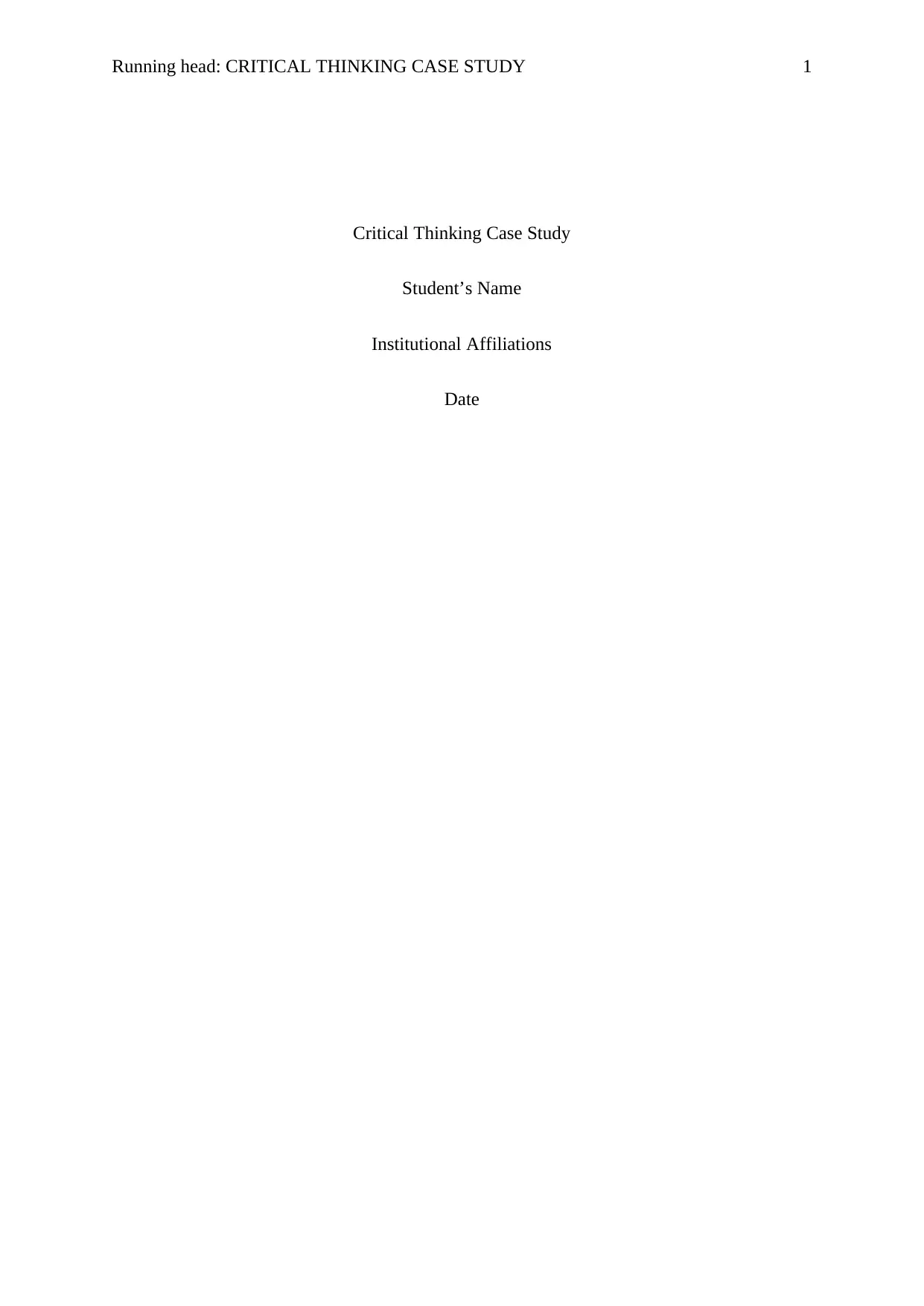
Running head: CRITICAL THINKING CASE STUDY 1
Critical Thinking Case Study
Student’s Name
Institutional Affiliations
Date
Critical Thinking Case Study
Student’s Name
Institutional Affiliations
Date
Paraphrase This Document
Need a fresh take? Get an instant paraphrase of this document with our AI Paraphraser
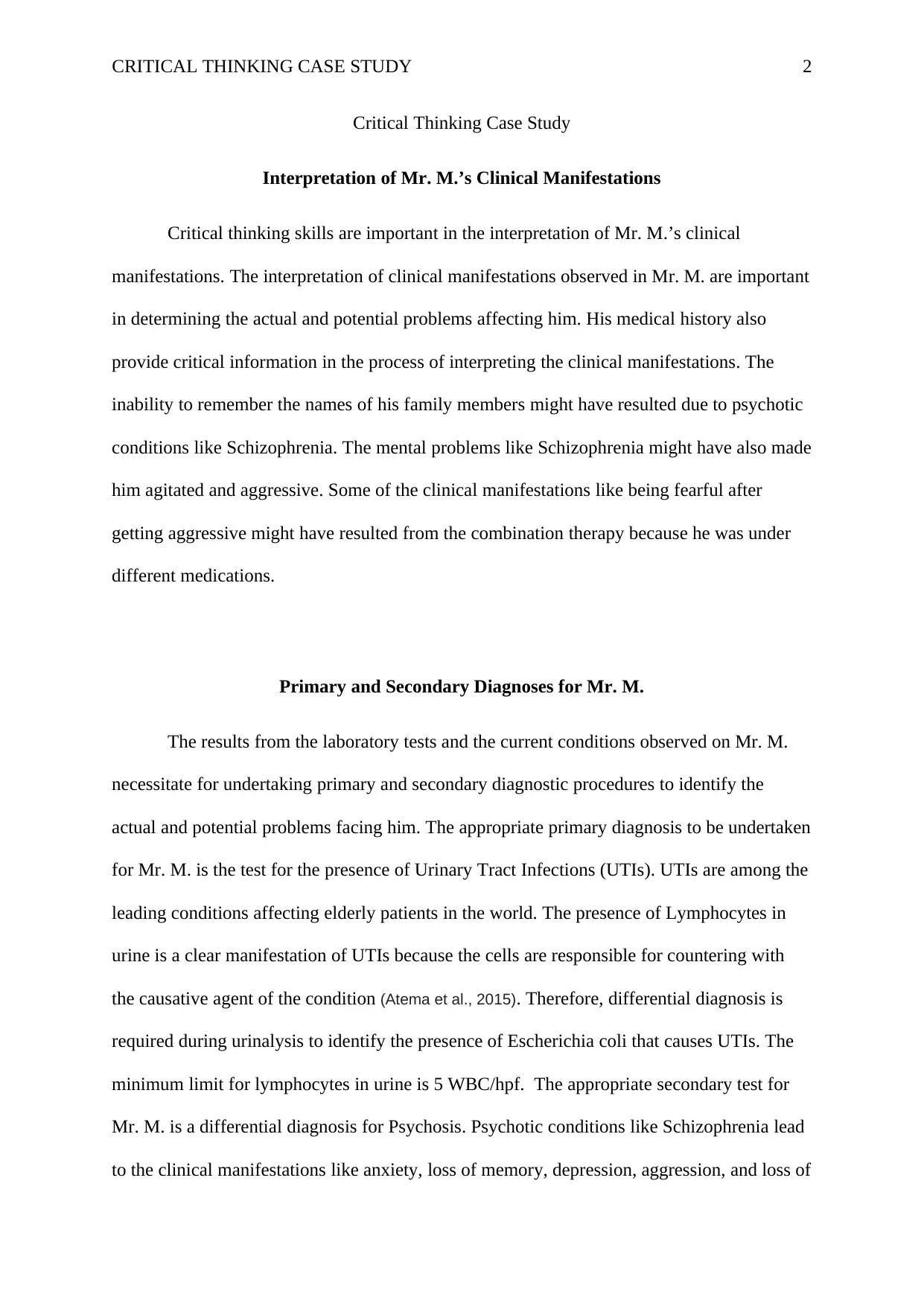
CRITICAL THINKING CASE STUDY 2
Critical Thinking Case Study
Interpretation of Mr. M.’s Clinical Manifestations
Critical thinking skills are important in the interpretation of Mr. M.’s clinical
manifestations. The interpretation of clinical manifestations observed in Mr. M. are important
in determining the actual and potential problems affecting him. His medical history also
provide critical information in the process of interpreting the clinical manifestations. The
inability to remember the names of his family members might have resulted due to psychotic
conditions like Schizophrenia. The mental problems like Schizophrenia might have also made
him agitated and aggressive. Some of the clinical manifestations like being fearful after
getting aggressive might have resulted from the combination therapy because he was under
different medications.
Primary and Secondary Diagnoses for Mr. M.
The results from the laboratory tests and the current conditions observed on Mr. M.
necessitate for undertaking primary and secondary diagnostic procedures to identify the
actual and potential problems facing him. The appropriate primary diagnosis to be undertaken
for Mr. M. is the test for the presence of Urinary Tract Infections (UTIs). UTIs are among the
leading conditions affecting elderly patients in the world. The presence of Lymphocytes in
urine is a clear manifestation of UTIs because the cells are responsible for countering with
the causative agent of the condition (Atema et al., 2015). Therefore, differential diagnosis is
required during urinalysis to identify the presence of Escherichia coli that causes UTIs. The
minimum limit for lymphocytes in urine is 5 WBC/hpf. The appropriate secondary test for
Mr. M. is a differential diagnosis for Psychosis. Psychotic conditions like Schizophrenia lead
to the clinical manifestations like anxiety, loss of memory, depression, aggression, and loss of
Critical Thinking Case Study
Interpretation of Mr. M.’s Clinical Manifestations
Critical thinking skills are important in the interpretation of Mr. M.’s clinical
manifestations. The interpretation of clinical manifestations observed in Mr. M. are important
in determining the actual and potential problems affecting him. His medical history also
provide critical information in the process of interpreting the clinical manifestations. The
inability to remember the names of his family members might have resulted due to psychotic
conditions like Schizophrenia. The mental problems like Schizophrenia might have also made
him agitated and aggressive. Some of the clinical manifestations like being fearful after
getting aggressive might have resulted from the combination therapy because he was under
different medications.
Primary and Secondary Diagnoses for Mr. M.
The results from the laboratory tests and the current conditions observed on Mr. M.
necessitate for undertaking primary and secondary diagnostic procedures to identify the
actual and potential problems facing him. The appropriate primary diagnosis to be undertaken
for Mr. M. is the test for the presence of Urinary Tract Infections (UTIs). UTIs are among the
leading conditions affecting elderly patients in the world. The presence of Lymphocytes in
urine is a clear manifestation of UTIs because the cells are responsible for countering with
the causative agent of the condition (Atema et al., 2015). Therefore, differential diagnosis is
required during urinalysis to identify the presence of Escherichia coli that causes UTIs. The
minimum limit for lymphocytes in urine is 5 WBC/hpf. The appropriate secondary test for
Mr. M. is a differential diagnosis for Psychosis. Psychotic conditions like Schizophrenia lead
to the clinical manifestations like anxiety, loss of memory, depression, aggression, and loss of
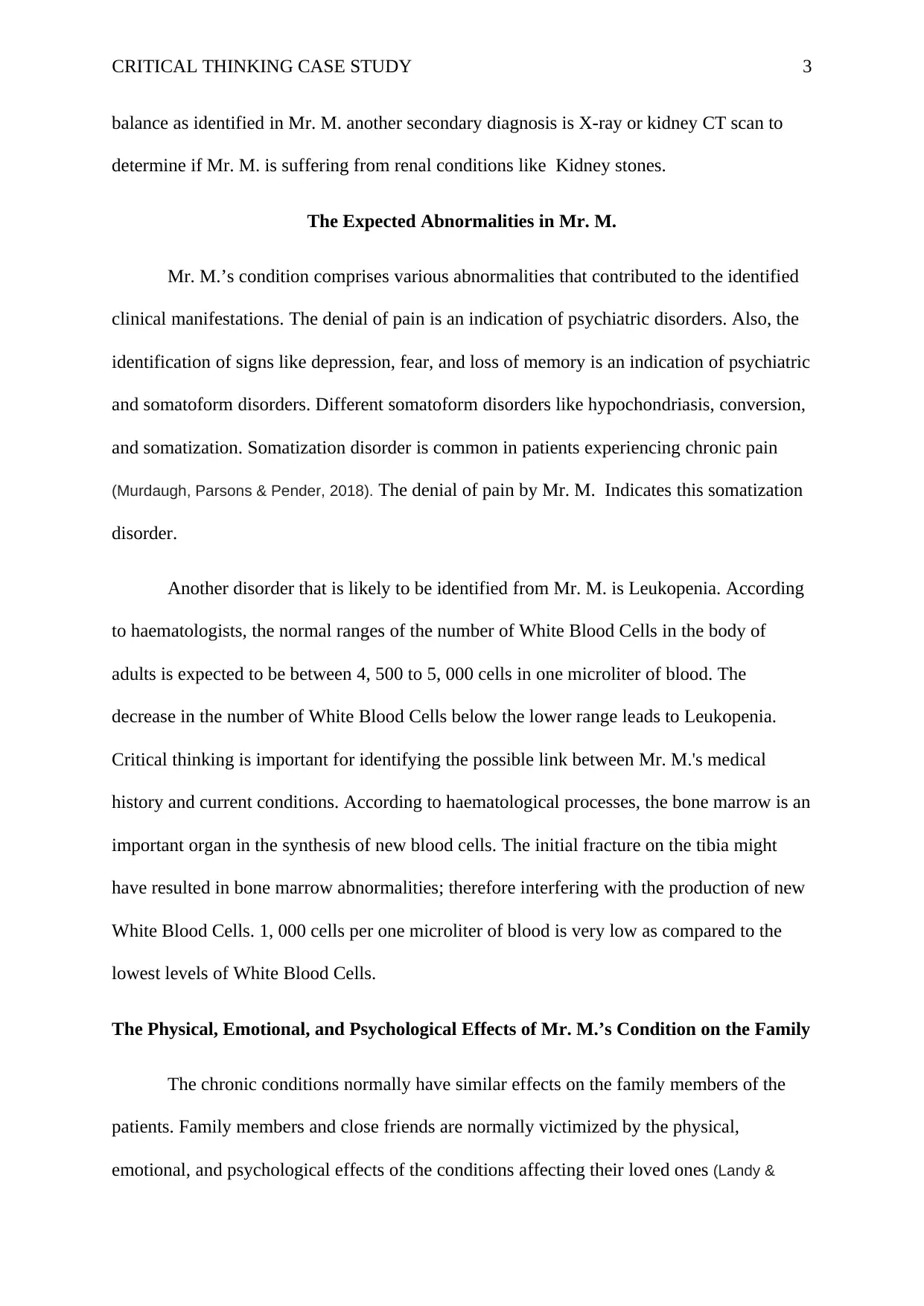
CRITICAL THINKING CASE STUDY 3
balance as identified in Mr. M. another secondary diagnosis is X-ray or kidney CT scan to
determine if Mr. M. is suffering from renal conditions like Kidney stones.
The Expected Abnormalities in Mr. M.
Mr. M.’s condition comprises various abnormalities that contributed to the identified
clinical manifestations. The denial of pain is an indication of psychiatric disorders. Also, the
identification of signs like depression, fear, and loss of memory is an indication of psychiatric
and somatoform disorders. Different somatoform disorders like hypochondriasis, conversion,
and somatization. Somatization disorder is common in patients experiencing chronic pain
(Murdaugh, Parsons & Pender, 2018). The denial of pain by Mr. M. Indicates this somatization
disorder.
Another disorder that is likely to be identified from Mr. M. is Leukopenia. According
to haematologists, the normal ranges of the number of White Blood Cells in the body of
adults is expected to be between 4, 500 to 5, 000 cells in one microliter of blood. The
decrease in the number of White Blood Cells below the lower range leads to Leukopenia.
Critical thinking is important for identifying the possible link between Mr. M.'s medical
history and current conditions. According to haematological processes, the bone marrow is an
important organ in the synthesis of new blood cells. The initial fracture on the tibia might
have resulted in bone marrow abnormalities; therefore interfering with the production of new
White Blood Cells. 1, 000 cells per one microliter of blood is very low as compared to the
lowest levels of White Blood Cells.
The Physical, Emotional, and Psychological Effects of Mr. M.’s Condition on the Family
The chronic conditions normally have similar effects on the family members of the
patients. Family members and close friends are normally victimized by the physical,
emotional, and psychological effects of the conditions affecting their loved ones (Landy &
balance as identified in Mr. M. another secondary diagnosis is X-ray or kidney CT scan to
determine if Mr. M. is suffering from renal conditions like Kidney stones.
The Expected Abnormalities in Mr. M.
Mr. M.’s condition comprises various abnormalities that contributed to the identified
clinical manifestations. The denial of pain is an indication of psychiatric disorders. Also, the
identification of signs like depression, fear, and loss of memory is an indication of psychiatric
and somatoform disorders. Different somatoform disorders like hypochondriasis, conversion,
and somatization. Somatization disorder is common in patients experiencing chronic pain
(Murdaugh, Parsons & Pender, 2018). The denial of pain by Mr. M. Indicates this somatization
disorder.
Another disorder that is likely to be identified from Mr. M. is Leukopenia. According
to haematologists, the normal ranges of the number of White Blood Cells in the body of
adults is expected to be between 4, 500 to 5, 000 cells in one microliter of blood. The
decrease in the number of White Blood Cells below the lower range leads to Leukopenia.
Critical thinking is important for identifying the possible link between Mr. M.'s medical
history and current conditions. According to haematological processes, the bone marrow is an
important organ in the synthesis of new blood cells. The initial fracture on the tibia might
have resulted in bone marrow abnormalities; therefore interfering with the production of new
White Blood Cells. 1, 000 cells per one microliter of blood is very low as compared to the
lowest levels of White Blood Cells.
The Physical, Emotional, and Psychological Effects of Mr. M.’s Condition on the Family
The chronic conditions normally have similar effects on the family members of the
patients. Family members and close friends are normally victimized by the physical,
emotional, and psychological effects of the conditions affecting their loved ones (Landy &
⊘ This is a preview!⊘
Do you want full access?
Subscribe today to unlock all pages.

Trusted by 1+ million students worldwide
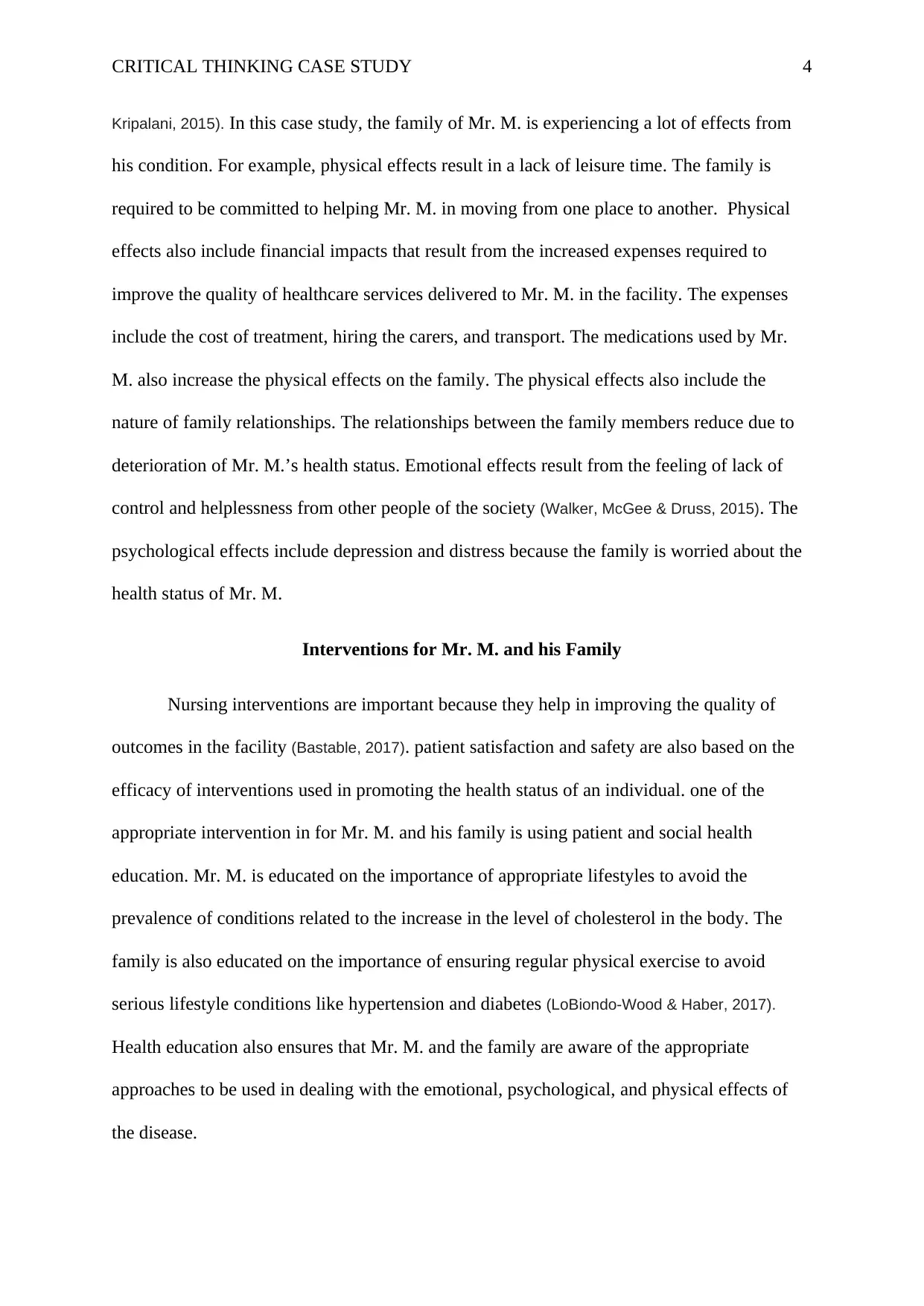
CRITICAL THINKING CASE STUDY 4
Kripalani, 2015). In this case study, the family of Mr. M. is experiencing a lot of effects from
his condition. For example, physical effects result in a lack of leisure time. The family is
required to be committed to helping Mr. M. in moving from one place to another. Physical
effects also include financial impacts that result from the increased expenses required to
improve the quality of healthcare services delivered to Mr. M. in the facility. The expenses
include the cost of treatment, hiring the carers, and transport. The medications used by Mr.
M. also increase the physical effects on the family. The physical effects also include the
nature of family relationships. The relationships between the family members reduce due to
deterioration of Mr. M.’s health status. Emotional effects result from the feeling of lack of
control and helplessness from other people of the society (Walker, McGee & Druss, 2015). The
psychological effects include depression and distress because the family is worried about the
health status of Mr. M.
Interventions for Mr. M. and his Family
Nursing interventions are important because they help in improving the quality of
outcomes in the facility (Bastable, 2017). patient satisfaction and safety are also based on the
efficacy of interventions used in promoting the health status of an individual. one of the
appropriate intervention in for Mr. M. and his family is using patient and social health
education. Mr. M. is educated on the importance of appropriate lifestyles to avoid the
prevalence of conditions related to the increase in the level of cholesterol in the body. The
family is also educated on the importance of ensuring regular physical exercise to avoid
serious lifestyle conditions like hypertension and diabetes (LoBiondo-Wood & Haber, 2017).
Health education also ensures that Mr. M. and the family are aware of the appropriate
approaches to be used in dealing with the emotional, psychological, and physical effects of
the disease.
Kripalani, 2015). In this case study, the family of Mr. M. is experiencing a lot of effects from
his condition. For example, physical effects result in a lack of leisure time. The family is
required to be committed to helping Mr. M. in moving from one place to another. Physical
effects also include financial impacts that result from the increased expenses required to
improve the quality of healthcare services delivered to Mr. M. in the facility. The expenses
include the cost of treatment, hiring the carers, and transport. The medications used by Mr.
M. also increase the physical effects on the family. The physical effects also include the
nature of family relationships. The relationships between the family members reduce due to
deterioration of Mr. M.’s health status. Emotional effects result from the feeling of lack of
control and helplessness from other people of the society (Walker, McGee & Druss, 2015). The
psychological effects include depression and distress because the family is worried about the
health status of Mr. M.
Interventions for Mr. M. and his Family
Nursing interventions are important because they help in improving the quality of
outcomes in the facility (Bastable, 2017). patient satisfaction and safety are also based on the
efficacy of interventions used in promoting the health status of an individual. one of the
appropriate intervention in for Mr. M. and his family is using patient and social health
education. Mr. M. is educated on the importance of appropriate lifestyles to avoid the
prevalence of conditions related to the increase in the level of cholesterol in the body. The
family is also educated on the importance of ensuring regular physical exercise to avoid
serious lifestyle conditions like hypertension and diabetes (LoBiondo-Wood & Haber, 2017).
Health education also ensures that Mr. M. and the family are aware of the appropriate
approaches to be used in dealing with the emotional, psychological, and physical effects of
the disease.
Paraphrase This Document
Need a fresh take? Get an instant paraphrase of this document with our AI Paraphraser
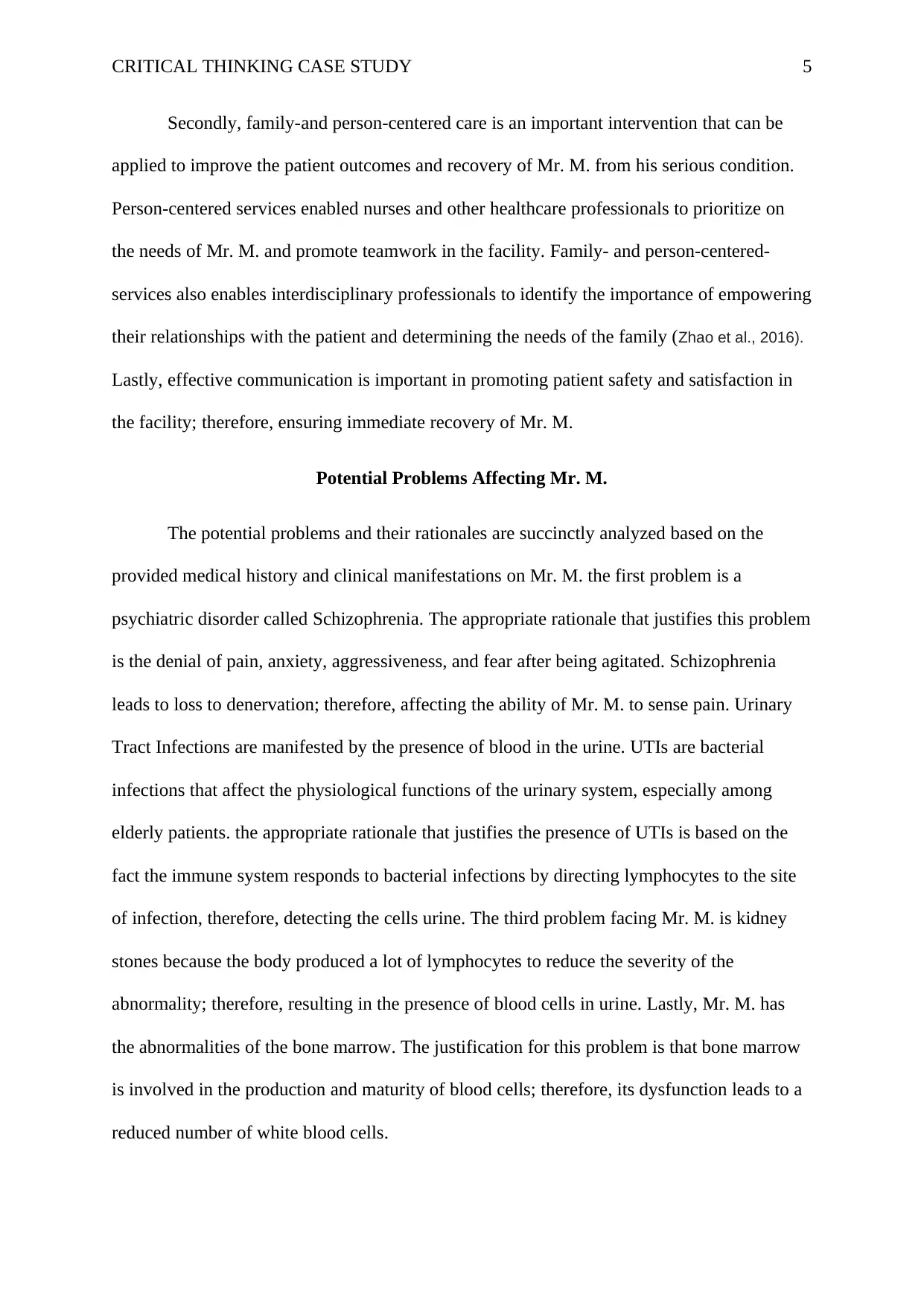
CRITICAL THINKING CASE STUDY 5
Secondly, family-and person-centered care is an important intervention that can be
applied to improve the patient outcomes and recovery of Mr. M. from his serious condition.
Person-centered services enabled nurses and other healthcare professionals to prioritize on
the needs of Mr. M. and promote teamwork in the facility. Family- and person-centered-
services also enables interdisciplinary professionals to identify the importance of empowering
their relationships with the patient and determining the needs of the family (Zhao et al., 2016).
Lastly, effective communication is important in promoting patient safety and satisfaction in
the facility; therefore, ensuring immediate recovery of Mr. M.
Potential Problems Affecting Mr. M.
The potential problems and their rationales are succinctly analyzed based on the
provided medical history and clinical manifestations on Mr. M. the first problem is a
psychiatric disorder called Schizophrenia. The appropriate rationale that justifies this problem
is the denial of pain, anxiety, aggressiveness, and fear after being agitated. Schizophrenia
leads to loss to denervation; therefore, affecting the ability of Mr. M. to sense pain. Urinary
Tract Infections are manifested by the presence of blood in the urine. UTIs are bacterial
infections that affect the physiological functions of the urinary system, especially among
elderly patients. the appropriate rationale that justifies the presence of UTIs is based on the
fact the immune system responds to bacterial infections by directing lymphocytes to the site
of infection, therefore, detecting the cells urine. The third problem facing Mr. M. is kidney
stones because the body produced a lot of lymphocytes to reduce the severity of the
abnormality; therefore, resulting in the presence of blood cells in urine. Lastly, Mr. M. has
the abnormalities of the bone marrow. The justification for this problem is that bone marrow
is involved in the production and maturity of blood cells; therefore, its dysfunction leads to a
reduced number of white blood cells.
Secondly, family-and person-centered care is an important intervention that can be
applied to improve the patient outcomes and recovery of Mr. M. from his serious condition.
Person-centered services enabled nurses and other healthcare professionals to prioritize on
the needs of Mr. M. and promote teamwork in the facility. Family- and person-centered-
services also enables interdisciplinary professionals to identify the importance of empowering
their relationships with the patient and determining the needs of the family (Zhao et al., 2016).
Lastly, effective communication is important in promoting patient safety and satisfaction in
the facility; therefore, ensuring immediate recovery of Mr. M.
Potential Problems Affecting Mr. M.
The potential problems and their rationales are succinctly analyzed based on the
provided medical history and clinical manifestations on Mr. M. the first problem is a
psychiatric disorder called Schizophrenia. The appropriate rationale that justifies this problem
is the denial of pain, anxiety, aggressiveness, and fear after being agitated. Schizophrenia
leads to loss to denervation; therefore, affecting the ability of Mr. M. to sense pain. Urinary
Tract Infections are manifested by the presence of blood in the urine. UTIs are bacterial
infections that affect the physiological functions of the urinary system, especially among
elderly patients. the appropriate rationale that justifies the presence of UTIs is based on the
fact the immune system responds to bacterial infections by directing lymphocytes to the site
of infection, therefore, detecting the cells urine. The third problem facing Mr. M. is kidney
stones because the body produced a lot of lymphocytes to reduce the severity of the
abnormality; therefore, resulting in the presence of blood cells in urine. Lastly, Mr. M. has
the abnormalities of the bone marrow. The justification for this problem is that bone marrow
is involved in the production and maturity of blood cells; therefore, its dysfunction leads to a
reduced number of white blood cells.

CRITICAL THINKING CASE STUDY 6
⊘ This is a preview!⊘
Do you want full access?
Subscribe today to unlock all pages.

Trusted by 1+ million students worldwide
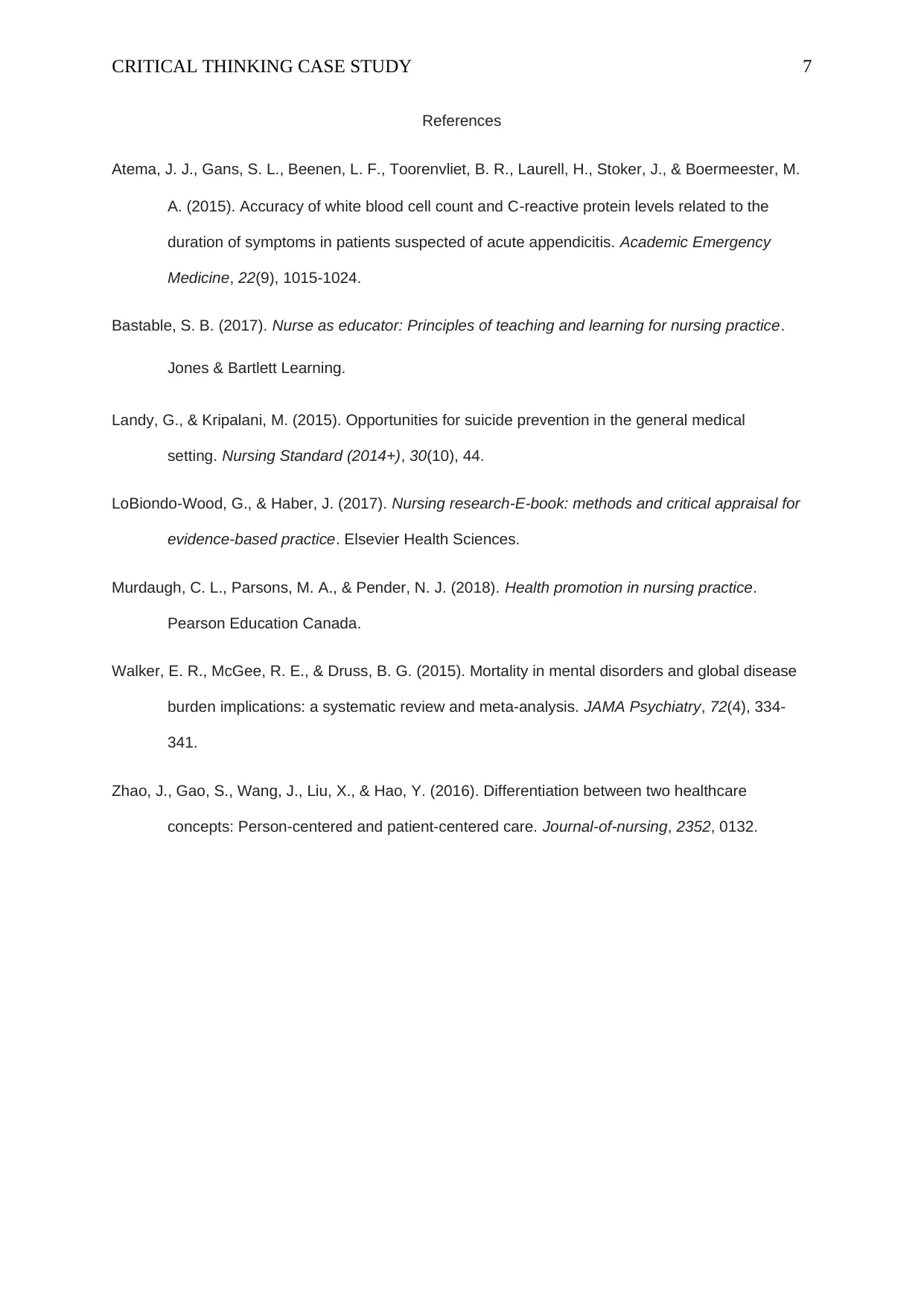
CRITICAL THINKING CASE STUDY 7
References
Atema, J. J., Gans, S. L., Beenen, L. F., Toorenvliet, B. R., Laurell, H., Stoker, J., & Boermeester, M.
A. (2015). Accuracy of white blood cell count and C‐reactive protein levels related to the
duration of symptoms in patients suspected of acute appendicitis. Academic Emergency
Medicine, 22(9), 1015-1024.
Bastable, S. B. (2017). Nurse as educator: Principles of teaching and learning for nursing practice.
Jones & Bartlett Learning.
Landy, G., & Kripalani, M. (2015). Opportunities for suicide prevention in the general medical
setting. Nursing Standard (2014+), 30(10), 44.
LoBiondo-Wood, G., & Haber, J. (2017). Nursing research-E-book: methods and critical appraisal for
evidence-based practice. Elsevier Health Sciences.
Murdaugh, C. L., Parsons, M. A., & Pender, N. J. (2018). Health promotion in nursing practice.
Pearson Education Canada.
Walker, E. R., McGee, R. E., & Druss, B. G. (2015). Mortality in mental disorders and global disease
burden implications: a systematic review and meta-analysis. JAMA Psychiatry, 72(4), 334-
341.
Zhao, J., Gao, S., Wang, J., Liu, X., & Hao, Y. (2016). Differentiation between two healthcare
concepts: Person-centered and patient-centered care. Journal-of-nursing, 2352, 0132.
References
Atema, J. J., Gans, S. L., Beenen, L. F., Toorenvliet, B. R., Laurell, H., Stoker, J., & Boermeester, M.
A. (2015). Accuracy of white blood cell count and C‐reactive protein levels related to the
duration of symptoms in patients suspected of acute appendicitis. Academic Emergency
Medicine, 22(9), 1015-1024.
Bastable, S. B. (2017). Nurse as educator: Principles of teaching and learning for nursing practice.
Jones & Bartlett Learning.
Landy, G., & Kripalani, M. (2015). Opportunities for suicide prevention in the general medical
setting. Nursing Standard (2014+), 30(10), 44.
LoBiondo-Wood, G., & Haber, J. (2017). Nursing research-E-book: methods and critical appraisal for
evidence-based practice. Elsevier Health Sciences.
Murdaugh, C. L., Parsons, M. A., & Pender, N. J. (2018). Health promotion in nursing practice.
Pearson Education Canada.
Walker, E. R., McGee, R. E., & Druss, B. G. (2015). Mortality in mental disorders and global disease
burden implications: a systematic review and meta-analysis. JAMA Psychiatry, 72(4), 334-
341.
Zhao, J., Gao, S., Wang, J., Liu, X., & Hao, Y. (2016). Differentiation between two healthcare
concepts: Person-centered and patient-centered care. Journal-of-nursing, 2352, 0132.
1 out of 7
Your All-in-One AI-Powered Toolkit for Academic Success.
+13062052269
info@desklib.com
Available 24*7 on WhatsApp / Email
![[object Object]](/_next/static/media/star-bottom.7253800d.svg)
Unlock your academic potential
Copyright © 2020–2025 A2Z Services. All Rights Reserved. Developed and managed by ZUCOL.
